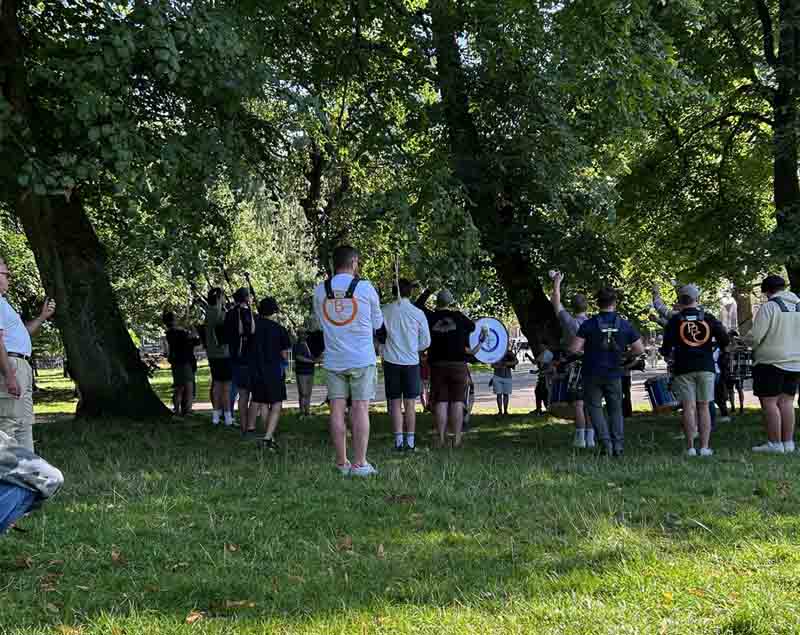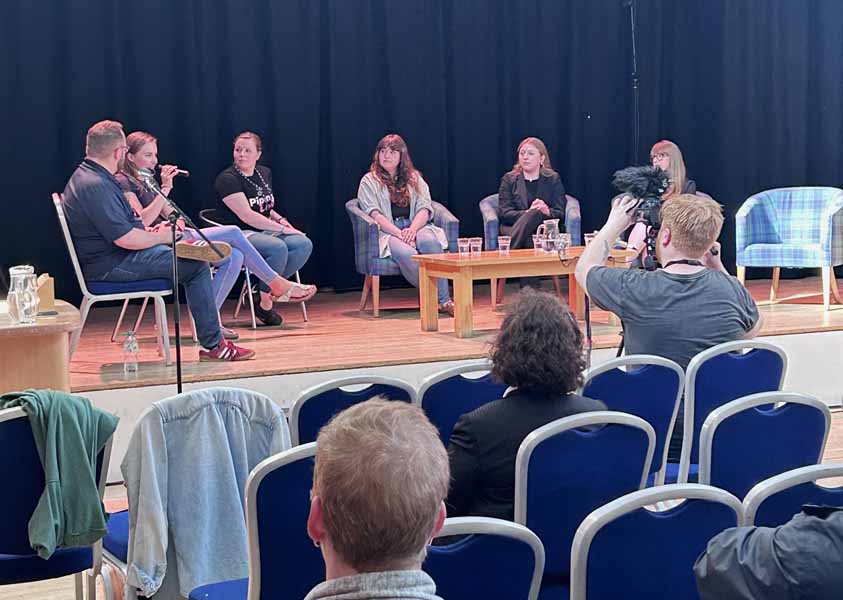Piping Live! on Thursday means distractions are critical. Iain and Barb MacDonald report
By Iain MacDonald and Barabara MacDonald
A regular contributor to pipes|drums, Iain MacDonald of Regina, Saskatchewan (don’t start to stutter) is one of Canada’s foremost pipers and contributors to the art. For decades, he has led pipe bands and taught dozens of newcomers to the pipes, many of whom have gone on to play and enjoy the instrument at the highest level. A pupil of Donald MacLeod, he still competes in solo events and with the Grade 1 78th Highlanders (Halifax Citadel). Iain will contribute his thoughts on various events during the next three days of this year’s Piping Live! festival.
Barbara MacDonald is also one of Canada’s greatest contributors to piping and drumming. An effective and tireless teacher, she’s introduced dozens of young (and older) pupils to the pipes, including her daughter, Eilidh, an accomplished soloist and piper with the Grade 1 Shotts & Dykehead Caledonia. Barb MacDonald played with Grade 1 Simon Fraser University and was pipe-sergeant of the Grade 2 City of Regina for many years. She now plays with the Grade 1 78th Highlanders (Halifax Citadel), and was elected president of the Saskatchewan Pipe Band Association this year.
Iain MacDonald reports:
Learn@Live: Composing with Fred Morrison
The National Piping Centre Auditorium
August 15, 2024 – £10
Anyone who’s paid attention to piping in the last 30 years will have heard at least one great Fred Morrison tune – from Fred himself, other solo pipers and recitalists, pipe bands such as FMM and Inveraray, or folk bands – we can hum at least one. It was a rare treat for the approximately 50 people gathered in the NPC auditorium to hear Morrison talk about his inspirations, his process, and his philosophy of music.

Morrison talked about the importance of flexing the creative muscle and his belief that we all have at least one good tune inside – the trick is to allow it to show itself. Using a set of A smallpipes, he demonstrated how some of the most complex music we know is based on a simple “hook” comprising three notes, and then the “craft” of the writer is to build on that hook by finding complementary ways of rearranging, inverting and adding to make a phrase, and then building an answer to that phrase, and so on. He demonstrated a process for quickly composing a 6/8 march, jotting notes on a board, and then building a tune around it.
The audience had many questions, and one of the great things about any Fred Morrison session I’ve attended is how friendly and engaging he is with each participant, making it seem more like an informal chat than a formal presentation. The mood was relaxed and friendly, and you get a clear sense from Morrison how passionate he is about the music.
He chatted a bit about his motivations for writing and how he prefers it when the tunes come directly out of an experience or a response to some emotion: friendship, humour, sadness and so on.
There was a lot of enthusiasm in the room, and at the end of the session, several people came forward to introduce themselves, get photos with Fred, and discuss points raised in the session.
Scotland’s Piping Heritage with Tobar an Dualchais
National Piping Centre Auditorium
August 15, 2024 – free
Dr. Decker Forrest presented an overview of the piping material on this website, which may not be familiar to all pipers but is a rich source of material for anyone interested in the culture of Scottish piping.
The website itself describes the project as: “Tobar an Dualchais/Kist o Riches is dedicated to the presentation and promotion of audio recordings of Scotland’s cultural heritage through its website and subsidiary projects. It exists to make these recordings widely accessible and to create a broader and deeper understanding of its content, inspiring new research and creative work, educational opportunities and community engagement.”

Forrest’s presentation dropped in on several of the piping “riches” in the website, highlighting material that gives useful detail and context to known piping history, including very personal remembrances of great names of the past.
This digital archive of material is searchable, easy to use, and packed with interesting content, some of which has inspired further research and discovery.
One downside of screen presentations in the NPC auditorium is that when the sun comes out, as it did, the light coming in the high windows makes the screen hard to see. Fortunately, much of the content was audio, and this was heard to the back.
Pipers who are unfamiliar with this archive are encouraged to check it out. There is so much great material available for study and entertainment, including old versions of tunes that will be of interest for building recital sets and medleys.
Forrest also encouraged those who can contribute via the funding link on the website.
Piping Live! Trade Fair
Glasgow Royal Concert Hall Exhibition Hall
August 15, 2024 – free
The PipingLive! Trade Fair featured about 20 trade stalls, including some bagpipe, chanter, accessories makers, paper products, bespoke jewelry, bag covers, tenor drumsticks, and other items, including whisky.

There seemed to be strong interest in several stalls, with instrument makers attracting people to play smallpipes and chanters.
Some of the bigger names in piping were not here, perhaps leaning into event sponsorship with their advertising budgets. Nonetheless, people moved in and out of the trade fair in numbers, and it seemed like the stalls were getting the attention for which they’d paid.
Street Café Session: Lauren Collier Band
National Piping Centre Street Café
August 15, 2024 – free
At 3 p.m., I settled into a chair in the Street Café, thinking (as the program indicated) that I would be attending Finlay MacDonald’s book launch. However, it seems there was a schedule change, and I was front and centre for this unexpected and enjoyable performance featuring the music of fiddler Lauren Collier and her band. The band features Ali Hutton (guitar), Gus Stirrat (bass), and Paul Jennings (drums).

The experience was unique for Piping Live! There was no piping or pipe tunes. The music could be described as “world music,” with tunes from Macedonia, India, Sweden, Norway, Scotland, and Haiti. Collier also sings in Haitian Creole and Rajasthani (India), neither of which language she actually speaks! The concert also featured a couple of her own tunes, which sat beautifully with the rest of the music.
While the style of music was unexpected in this context, it was a highly enjoyable hour of music. Collier and the band were excellent as they worked their way through this trip around the world, and the packed café was warmly responsive to the music.
Collier’s album Uddevala is available via her website and also from the boot of her car if you happen to catch her loading up for a show. Either way, it’ll be worth the investment.
Barbara MacDonald reports:
The Big Sing 2024
National Piping Centre Auditorium
August 15th – free
The Big Sing 2024 was an engaging workshop with Barnaby Brown leading a group of about 30 people through the notes and emotions of “Mallachd nam Pìobairean” – The Curse of the Pipers. In a Hebridean canntaireachd approach, he facilitated the group to sing and learn the hand gestures for the notes and the corresponding syllables, with low A, described as the horizon and home (hin).
Brown had the group moving through the paces, sometimes sitting, sometimes standing, and sometimes having each side of the room offer different components to hear and feel the music and its emotions emerge.

With the audience providing a sustained drone sound of low A, Brown began to sing and describe the notes and emotions of the urlar. He describes that as pipers we have the rich harmonic of the drone in our left ear, providing the space for the ‘partials to be alive and ringing’. He notes that it is only with the drone that the rich harmonics of each note emerge and that each note of the chanter has a different emotion against the drone.
Brown described the F as a note of sorrow against the drone in this case. With hand signals for each of the notes, he coached the group through the urlar, noting that the first phrase is exasperation; the second is anguish, suffering, and regret, with “a little bit of love” in the third phrase; and the fourth phrase begins and ends in low G.
Brown notes that to “sell” piobaireachd to kids or those who are unfamiliar with it, it is important to focus on the pace and movement. After the urlar, meaning ground or home, like “being on the sofa,” it is time to move on, and “like a Hebridean dervish, it begins slowly and then starts to move.”
Working through the phrases of the four-line “stanza,” Brown had the group move through the remainder of the tune, adding the notes, hand gestures, emotion, singing, and droning with collective energy, passion, and connection through song.
The Queen of Volunteers

It was a pleasure to sit next to and meet long-time Piping Live! volunteer Lisa Farber of New York, who self-describes as “not a very good piper but a much better flute player.”
It all began in 2004 when she came to the then-Piping Centre (not yet “National”) for tuition. The instructors suggested that she might enjoy staying for the festival. Farber asked if they needed any volunteers, and that was the beginning of an annual trek to Piping Live!
With an astonishing 21 years of stepping up for PipingLive!, I suggest the title “Queen of Volunteers” might be most fitting.
Thank you, Lisa!
Stay tuned for more on PipingLive! from pipes|drums agents in the field.





NO COMMENTS YET